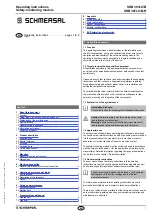
2
Operating instructions
Safety-monitoring module
SRB 301LC/B
SRB 301LC/B-R
EN
1.6 Warning about misuse
In case of inadequate or improper use or manipulations of
the safety-monitoring module, personal hazards or damage
to machinery or plant components cannot be excluded.
The relevant requirements of the standards ISO 14119 and
ISO 13850 must be observed.
1.7 Exclusion of liability
We shall accept no liability for damages and malfunctions resulting from
defective mounting or failure to comply with this operating instructions
manual. The manufacturer shall accept no liability for damages
resulting from the use of unauthorised spare parts or accessories.
For safety reasons, invasive work on the device as well as arbitrary
repairs, conversions and modifications to the device are strictly
forbidden; the manufacturer shall accept no liability for damages
resulting from such invasive work, arbitrary repairs, conversions and/or
modifications to the device.
The safety-monitoring module must only be used when the enclosure is
closed, i.e. with the front cover fitted.
2. Product description
2.1 Ordering code
This operating instructions manual applies to the following types:
SRB 301LC/B
SRB 301LC/B-R
Only if the information described in this operating instructions
manual are realised correctly, the safety function and therefore
the compliance with the Machinery Directive is maintained.
2.2 Special versions
For special versions, which are not listed in the order code below 2.1,
these specifications apply accordingly, provided that they correspond to
the standard version.
2.3 Purpose
The safety-monitoring modules for integration in safety circuits are
designed for fitting in control cabinets. They are used for the safe
evaluation of the signals of positive break position switches or magnetic
safety sensors for safety functions on sliding, hinged and removable
safety guards as well as emergency stop control devices and AOPD's.
The safety function is defined as the opening of the enabling circuits
13-14, 23-24 and 33-34 when the inputs S11-S12 and/or S11-S22 are
opened. The safety-relevant current paths with the outputs contacts
13-14, 23-24 and 33-34 meet the following requirements under
observation of a PFH value assessment (also refer to chapter 2.5
"Safety classification"):
– Control category 4 - PL e to ISO 13849-1
– SIL 3 to IEC 61508-2
– SILCL 3 to IEC 62061
To determine the Performance Level (PL) to ISO 13849-1 of the entire
safety function (e.g. sensor, logic, actuator), an assessment of all
relevant components is required.
The entire concept of the control system in which the safety
component is integrated, must be validated to the relevant
standards.
2.4 Technical data
General data:
Standards:
EN 60204-1, EN 60947-5-1;
ISO 13849-1, IEC 61508
Climate resistance:
EN 60068-2-78
Mounting:
snaps onto standard DIN rail to EN 60715
Terminal designations:
EN 60947-1
Material of the housings:
Plastic, glass-fibre reinforced thermoplastic,
ventilated
Material of the contacts:
AgSnO, self-cleaning, positive drive
Weight:
230 g
Start conditions:
Automatic or start button
Feedback circuit (Y/N):
yes
Pull-in delay for automatic start
- LC/B:
300 ms
- LC/B-R:
50 ms
Pull-in delay with reset button:
20 ms
Drop-out delay in case of "emergency stop":
25 ms
Mechanical data:
Connection type:
Screw connection
Min. cable section:
0.25 mm²
Max. cable section:
2.5 mm²
Connecting cable:
rigid or flexible
Tightening torque for the terminals:
0.6 Nm
With removable terminals (Y/N):
Nein
Mechanical life:
10 million operations
Electrical life:
Derating curve available on request
Resistance to shock:
10 g / 11 ms
Resistance to vibrations
to EN 60068-2-6:
10 ... 55 Hz,
amplitude 0.35 mm
Ambient conditions:
Ambient temperature:
- LC/B:
–25 °C … +45 °C
- LCB/R:
–25 °C … +50 °C
Storage and transport temperature:
–40 °C … +85 °C
Protection class:
Enclosure: IP40
Terminals: IP20
Clearance: IP54
Air clearances and creepage distances
to IEC 60664-1:
4 kV/2 (basic insulation)
EMC rating:
to EMC Directive
Electrical data:
Contact resistance in new state:
max. 100 mΩ
Power consumption:
max. 1.7 W / 1.9 VA
Rated operating voltage U
e
:
- LC/B:
24 VDC –15% / +20%,
residual ripple max. 10%,
24 VAC –15% / +10%
- LC/B-R:
24 VDC –15% / +40%,
residual ripple max. 10%,
24 VAC –15% / +10%
Frequency range:
50 / 60 Hz
Fuse rating for the operating voltage:
glass fuse;
internal T 1.0 A (5 x 20 mm)
Monitored inputs:
Short-circuit recognition (Y/N):
No
Wire breakage detection (Y/N):
Yes
Earth leakage detection (Y/N):
Yes
Number of NO contacts:
0
Number of NC contacts:
2
Cable length:
1-channel without cross-wire short detection:
– 1,500 m = 1.5 mm²
– 2,500 m = 2.5 mm²
2-channel without cross-wire short detection
Conduction resistance:
max. 40 Ω
Outputs:
Number of safety contacts:
3
Number of auxiliary contacts:
1
Number of signalling outputs:
0






